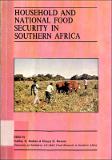| dc.contributor.author | Chidzero, Bernard T.G. | |
| dc.coverage.spatial | Africa. | en |
| dc.date.accessioned | 2015-12-16T14:19:26Z | |
| dc.date.available | 2015-12-16T14:19:26Z | |
| dc.date.issued | 1989 | |
| dc.identifier.citation | Chidzero, B.T.G. (1989) Economic policy reform agenda for Southern Africa. In: Mudimu, G.D. and Bernsten, R.H. (eds.) Household and National Food Security in Southern Africa, pp. 7-15. Harare: DAEE. | en |
| dc.identifier.uri | https://opendocs.ids.ac.uk/opendocs/handle/20.500.12413/7238 | |
| dc.description | Originally conference paper on economic policy reform agenda for Southern Africa in the 1980's, presented at the Fourth Annual Conference on Food Security In Southern Africa, 31 October- 3 November, 1988. | en |
| dc.description.abstract | I would like, in attempting to determine possible policy reform options open to Southern Africa to facilitate economic growth, including food security and raising the standards of living of our peoples, to outline briefly some of the major constraints to economic growth in the region. These can conveniently be broadly classified into three categories, viz. external circumstances, factors of nature, and domestic conditions and policies.
Regarding external circumstances, there can be little doubt in anybody’s mind that during the 1980s the global economic environment, which has had a negative impact on developing countries, had been characterised, inter alia, by:
o declining commodity prices and deterioration in terms of trade of developing countries;
o reduced export earnings and growing balance of payments difficulties;
o growing protectionism in the developed market economies, including wasteful agricultural subsidies and escalation of tariffs on manufactured exports of developing countries;
o reduced official development assistance (ODA) flows in real terms, coinciding with reduced export earnings;
o reverse financial flows from developing to developed countries, and the overarching debt crisis which threatens the viability of our fragile economies and could undermine the international monetary and financial system itself;
o high real interest rates and rising or fluctuating exchange rates, including misalignment of macroeconomic policies in developed countries, and aggravation of the debt burden; and
o erosion of multilateralism and a tendency to resort more and more to unilateral and bilateral actions, in any case preoccupation with domestic issues such as inflation and unemployment in industrialised countries, until relatively ^recently when multilateralism could be said to be on a revival path. | en |
| dc.language.iso | en | en |
| dc.publisher | Department Of Agricultural Economics and Extension (DAEE), University of Zimbabwe (UZ) | en |
| dc.rights.uri | http://creativecommons.org/licenses/by-nc-nd/3.0/ | en |
| dc.subject | Development Policy | en |
| dc.subject | Economic Development | en |
| dc.title | Economic policy reform agenda for Southern Africa | en |
| dc.type | Book chapter | en |
| dc.type | Conference paper | en |
| dc.rights.holder | University of Zimbabwe (UZ) | en |


